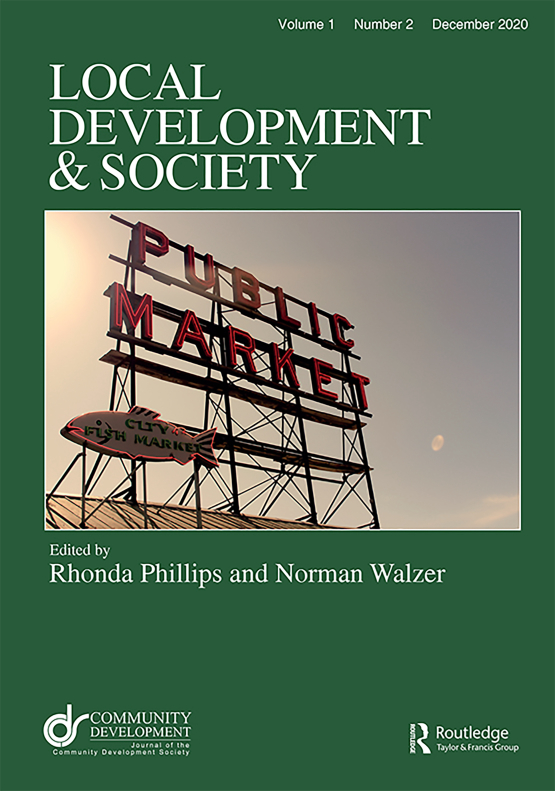Submit a Manuscript to the Journal
Local Development & Society
For a Special Issue on
Historic Resources and Cultural Preservation in Local Development
Abstract deadline
15 July 2024
Manuscript deadline
15 January 2025

Special Issue Editor(s)
Anne-Lise K. Velez, MArch, Ph.D.,
Virginia Tech
[email protected]
Candice P. Bodkin, Ph.D,
Georgia Southern University
[email protected]
Kristina R. Patterson, Ph.D.,
Georgia Southern University
[email protected]
Historic Resources and Cultural Preservation in Local Development
Special Issue Overview:
Heritage conservation is important to local development including a sense of place, understanding of history, and local economies. Historic cultural resources comprise a wide range of tangible and intangible resources from archaeological relics and sites, historic structures and districts, places of traditional indigenous significance, and lifeways. Historic resources have long been valued in the U.S. with a history of cultural and legislative support for preservation ranging from 18th century funding to maintain Revolutionary War monuments (Benson & Klein, 2008) to the Antiquities Act of 1904, National Historic Preservation Act of 1966, and inclusion of cultural resources in the National Environmental Policy Act of 1969. Heritage tourism and local cultural activities play important roles in local economies (Graham et al., 2000; Kebir & Crevoisier, 2008; Rypkema et al., 2011). In addition to driving economic development through heritage tourism, preservation of historic cultural resources can foster cohesion in communities and create and regenerate local social fabric as part of the iterative production of meaning and identity (Sacco et al., 2013; Gallagher B.K., 2021), improving resiliency and quality of life (OECD.org) for local and regional communities (Coffey & Polèse, 1984).
According to Dawkins (2023). “local development is understood as a process of improvement of the economic, social and environmental situation of a given area based on the use of endogenous resources in order to improve the well-being and quality of life of its population” (p.131). Mason and Page (2004) suggest that heritage, or historic, preservation has contributed to urban development and the built environment and shaping urban space. In this special issue, we further these earlier scholarly forays into the nexus between historic preservation as a force for shaping place-based change in both urban and nonurban spaces. Historic preservation has evolved from a movement to a practice, specifically as a local practice Tyler, Tyler, & Ligibel (2018). Topics include, but are not limited to:
- the role of heritage preservation and historic cultural resources in local development
- cross-disciplinary research and contexts providing varied academic and practitioner viewpoints related to preservation and local development
- practitioners working locally and within regional systems to consider best practices and lessons learned related to place-based local development initiatives
- and related themes with a connection to local development
Looking to Publish your Research?
Find out how to publish your research open access with Taylor & Francis Group.
Choose open accessSubmission Instructions
Proposal Submission Process and Timeline:
We encourage the submission of work from interdisciplinary teams or perspectives with clear implications for practitioners as well as scholarly value to create an issue that will appeal to and be useful to both scholars and practitioners. This special issue will focus on understanding the breadth of relationships between historic resources, or heritage conservation, and local development.
Areas of study may include public management, nonprofit management, conservation and preservation management, tourism management social entrepreneurship, health, public art, preservation and conservation education, urban planning, and community development, among others.
Potential contributions:
The types of papers may include:
- Case studies
- Empirical research studies
- Theory building
- Book reviews
We are seeking original articles with a maximum of 8,000 words, all-inclusive. Book reviews for recent books not to exceed 1800 words all inclusive.
Abstract Submission:
For consideration, send a 500-word proposal via email to [email protected] by July 15, 2024 using the subject line LDS Proposal Abstract.
Proposals should include information on the purpose or aim of the article including an abstract, a discussion of the methods or approach used, and a discussion of the fit with the special issue topic. Please include author name(s), affiliation(s), and full contact information.
Proposal decisions will be sent by Sept. 1, 2024.
Full manuscripts will be due by January 15, 2025 for peer review. Final decision on the manuscript acceptance is anticipated by August 1, 2025 with final submission September 15, 2025. Once accepted manuscripts will be published online and issued a DOI with the actual special issue to be published at a later date once all articles have been submitted reviewed and accepted.
Manuscripts are required to be submitted to the Local Development and Society, Scholar One system. Manuscripts submitted to the special issue editors outside of the Scholar One system will be returned to submit in the system.